Thank you to everyone who joined us on 9/17 to tell governments and corporations Enough is Enough and demand an end to fossil fuel investment. We had a great turnout, and a fantastic rally, march, and die-in to protest government inaction, complacency, and greenwashing on the eve of the UN General Assembly. This is only the first action in the lead-up to COP 26, and it sent a strong message that We. Are. Watching. Plus, your participation in the rally and march provided cover for three nonviolent direct actions against three banks that are the largest investors of fossil fuels - Bank of America, JP Morgan Chase, and Citibank. Just in case the crowds, signs, blocking of entrances, and arrests didn’t draw enough attention, there was also a boat drop in the middle of the street with a sign saying “Stop the Greenwashing.” 36 people were arrested, and it took the NYPD over five hours to remove the protestors. Read more about the coordinated events and watch the video! |
@xr_nyc says pipelines can't happen without investments from financial institutions
I detest activist nostalgia.
There is much too much to do in the current moment.
So we battle away.
I loved Occupy Wall Street.
Don’t look back.
Well, ok sometimes look back.
As a public commons, it was a place to see everyone I knew, every week
for months and months.
New York has lost so many commons, Charas, etc.
It was great to just run into activist comrades like we used to.
There was a time when we’d run into David Graeber or members the Young
Lords organizing to shut down US military bombings in Vieques on any given
afternoon, in between meetings.
And then the city shut it down.
But for a while there, it was that.
Every time I went I ran into old friends and new friends, as well as ideas
in the chalk on the sidewalk, new ways of thinking about politics, wanderlust,
desire, Situationism, Marxism, and battles overpublic space.
It was a movement about income inequality that found expression in
conflicts over public space.
It was also a scene.
Squatters and comic book writers, anarchist puppeteers met with drag
performers, staging political performances every day.
On and on and on.
But it wasn’t a place where people focused on specific issues for very
long, beyond ‘shits fucked up’ and inequality.
It didn’t last.
But ideas burst from there, movements, Occupy Sandy, Black Lives
Matters, People’s Puppets, Strike Debt, and Occupy the Pipeline.
The committees were bountiful, Outreach, Direct Action. I got involved with
the Sustainability Committee, that brought the food waste out of the encampment
into the community gardens of the Lower East Side, connecting what was happening
in the park with the city, the bike lanes and non supporting transportation, with
gardens and livable urban ecology, and energy.
In the years after the movement dwindled, everyone went in separate
directions.
But one affinity group kept going, Occupy the Pipeline, connecting
sustainability issues with battles against fracked gas pipelines. They picked
an issue, fracked gas, focused like a lazar beam, and worked to help ban the
practice in New York state.
What they did not succeed in was banning the production of natural gas infrastructure
in New York.
The state would continue to build pipelines to move natural gas.
Financial institutions would continue to fund the projects.
And politicians would turn their backs on activists imploring them to block
permits for these projects, even after the Paris Climate Agreement and New York Climate Leadership and Community Protection Act were passed.
In other words, they could not stop the means of production, supported
by a system of financial institutions and politicians and oil companies.
In the Operating System, Erik Laursen (2021, 17) suggests humanity faces three
distinct challenges, each interrelated. These include climate change, income
inequality, and mass migration. Each of
these phenomena overlap. Climate change, witnessed in landslides disrupting
lives, storms, rising sea levels, creates more migration crises, adding to the numbers
of those seeking asylum. At any given
moment, one of these phenomena can transform lives. Those on the Gulf Coast know it. In my neighborhood in the Gowanus, people are
still cleaning out their flooded homes after Ida, reconciling with the damage.
On the ten-year anniversary of Occupy Wall Street, these issues merged
again, as struggles against exponential inequality merged with struggles
against fossil fuel and the big banks.
There are some mornings, you feel history coursing through you. That was the feeling on Friday riding the
subway with the teenager, walking out into the morning on 42nd
street. Mist and a bit of morning due,
the signs blinking, crisp fall, I was meeting members of Extinction Rebellion
in Bryant Park. Pre action butterflies danced in my stomach. I thought about the other actions there, antiwar
rallies, reclaim the streets on buy nothing day 1999, militarized police, the
Feb 2003 anti war riot with color alerts bleeping all day long.
715 AM, we met in the park, talked about our rolls, and walked across
the street to 42nd and 6th, where a van dropped off three
pieces of lumber tied together.
Three of us at the front, three in back, we pulled it out. And the van
drove off. Stepping in front of the entrance of the Bank of America, we lifted
it at one end, setting up a tripod. A woman with a carabiner hoisted herself to
the top, dangling down, held by ropes.
In the meantime, activists helped
hoist two banners:
“$198 Billion Invested in Fossil Fuels since the Paris Agreement.”
“Stop Funding Fossil Death.”
Four of us secured the ends of the tripods on the ground.
“Why’d you put this on private property?” asks one of the security guards
who notices us.
I’m surprised we got it up before security or police showed.
“That was a fast deployment,” said one of the activists, now holding one
of the three ends of the tripod so the climber was secure. Up in less than a
minute, by 8 AM.
“There are so many things we can all do,” said another, referring to the
IPCC
report on climate.
Still, the clock is ticking.
In many respects, we’re
running out of wiggle room.
But can we change the means of production, the relationship of people to
our financial system, to buying and selling, habitual economic growth, extracting
resources, heating the planet.
I remember Robin
Williams and Better Midler doing a performance for earth day years ago.
Robin was playing the humans; Bette, an ailing Mother Earth.
Robin talked about progress and technology.
Bette lamented the speed of the industrial revolution, followed by gadgets,
things, consuming, and shopping. Still she noted, she’d be fine.
“I will survive… Its you I’m
worried about.”
“How are you doing?” asks a white shirt policeman, strolling up to
assess the scene, around nine AM.
Another crew of activists are blocking the entrances to the building.
He walks up to the other cops.
They do not seem too concerned, taking it all in.
Onlookers are dropping by and snapping shots, school kids stopping to read
our signs, and take selfies. Only a few hecklers. “Get a job,” is the usual
rant. “Climate change is a hoax!” It’s
probably a good idea to ignore these messages. Engagement often leads to
conflict which gets in the way of our message. The Gandhian principle of nonviolence extends into language.
Sometimes its better to maintain a quiet, peaceful disposition.
But maybe we’re being too polite?
“Please stop funding climate change, please!!!” said another activist passing
out flyers to everyone going inside the building through the one entrance that
is open.
“I’m here taking space in front of the Bank of America,” said Taylor,
sitting chained to the tripod. “Fossil fuel investment is investing in deaths
floods, fires, storms. I’m holding this space for those who are threatened,
endangered, evicted. I’m here for my
children’s children. We can’t stop until this is addressed.”
Our climber looks out from her cocoon like perch, hanging from the tripod,
taking in the scene. We send up cookies and snacks as they arrive.
All morning, more and more people drop by.
“I’m here because some day I want to have kids and I want to make sure
this world is safe for them,” says another activist. A majority of those
risking arrest are women. I’m holding the tripod, documenting as much as I can
“Divest now, off fossil fuels,” we chant, as the band Resistance Company
plays.
“We are unstoppable, another world is possible!”
“Defund line three, no Brooklyn pipeline.”
By noon, the police arrive with a caterpillar truck that can hoist the
climber out of our tripod without injury.
We get three warnings to leave or face arrest, putting police warning tape
around the space.
The singer stays performing.
And a group of police surrounds him, pulling him out of there.
And one by one the activists holding the tripod are arrested.
“We see you, we love you!” we
scream.
Legal support is getting info, about where they are going.
Throughout the morning we hear about other actions, a boat in Times
Square, other trips in front of more financial institutions, putting them on
notice, before the next COP meeting in Glasgow.
At the public library, kids are giving speeches to still more out there. They swarm through the streets, dying in at
major intersections all afternoons.
I make my way down to 388 Greenwich Street, where activists have put up
another tripod in the Privately Owned Public Space in front of the Chase Bank
there. The police can’t move it as it’s
a public space.
A few of us from the morning action are there.
We chat for a bit about it all, the actions, the history, future tasks,
goals, feeling good about the work of the day, but hoping for more.
I make my way to Zuccotti Park where a few activists are chatting during
a reunion, sharing pizza. One man is blowing
a whistle to the old Occupy Chant, all day, all week, occupy wall street.
“I was on a contact high the whole time,” said John, a journalist,
looking back.
Mark noted that after its over he’s always on his own.
The park was a place to hatch plans and to beat back alienation.
“De Occupy Your Settler Colonial Mind” says one graffiti.
“Eat the rich!”
“Our one demand, everything.”
On we chatted, connecting what had been with what was coming, beyond nostalgia,
connecting a decade of climate actions, the
people’s climate march, Sandy, Paris, fights for bike lanes, mutual aid
projects, pandemics, waves of police brutality, Ida, struggles
for sustainable urbanism and a city where we look out for each other, one slice
of pizza at a time.
But have we beaten back inequality or climate chaos?
Maybe we are all being too polite as the world drags its feet?
The New York Times seems to be suggesting so:
United
Nations Warns of ‘Catastrophic Pathway’ With Current Climate Pledges
An
accounting of promises made by countries in the years since the Paris accord
found that they are not enough to avoid drastic impacts from climate change.
Somini Sengupta
Sept. 17, 2021
“The
global average temperature will rise 2.7 degrees Celsius by century’s end even
if all countries meet their promised emissions cuts, a rise that is likely to
worsen extreme wildfires, droughts and floods, the United Nations said in a
report on Friday. That level of warming, measured against preindustrial levels,
is likely to increase the frequency of deadly heat waves and threaten coastal
cities with rising sea levels, the country-by-country analysis concluded. The United Nations Secretary General António
Guterres said it shows “the world is on a catastrophic pathway.” Perhaps most
starkly, the new report displayed the large gap between what the scientific
consensus urges world leaders to do and what those leaders have been willing to
do so far. Emissions of planet-warming gases are poised to grow by 16 percent
during this decade compared with 2010 levels, even as the latest scientific
research indicates that they need to decrease by at least a quarter by 2030 to
avert the worst impacts of global warming.”
























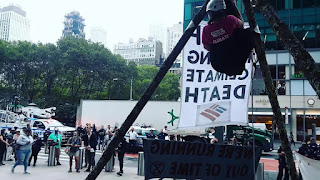






































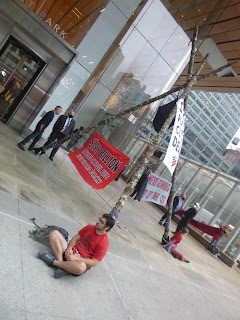

















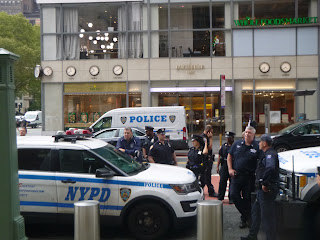

















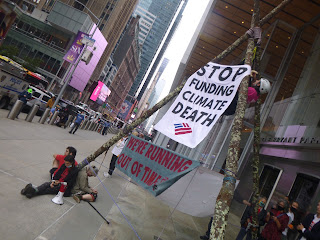




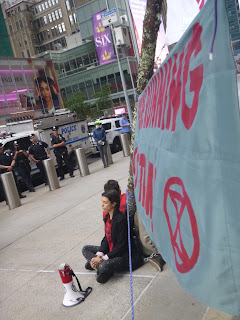





























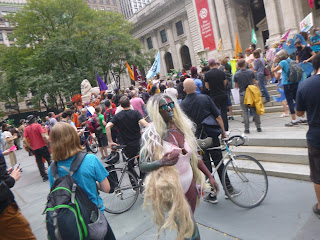


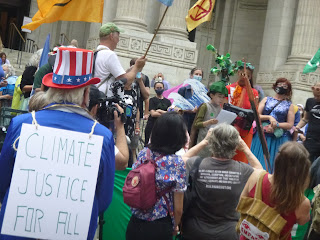




















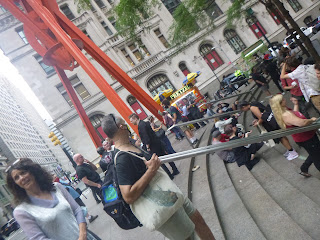







No comments:
Post a Comment